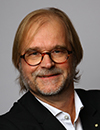Holger Becker,
Chief Scientific Officer,
Microfluidic ChipShop GmbH
Dr. Holger Becker is co-founder and CSO of microfluidic ChipShop GmbH. He obtained physics degrees from the University of Western Australia/Perth and the University of Heidelberg. He started to work on miniaturized systems for chemical analysis during his PhD-thesis at Heidelberg university, where he obtained his PhD in 1995. Between 1995 and 1997 he was a Research Associate at Imperial College with Prof. Andreas Manz. In 1998 he joined Jenoptik Mikrotechnik GmbH. Since then, he founded and led several companies in the field of microsystem technologies in medicine and the life sciences. He lead the Industry Group of the German Physical Society between 2004 and 2009 and is Conference Chair for the SPIE "Microfluidics, BioMEMS and Medical Microsystems" conference as well as acting as regular reviewer of project proposals on national and EU level and for several journals devoted to microsystem technologies.
|

|
|

 Add to Calendar ▼2017-07-10 16:30:002017-07-10 17:30:00Europe/LondonMicrofluidic Organ-on-a-Chip Devices for Stem-Cell Cultivation, Differentiation and Toxicity TestingSELECTBIOenquiries@selectbiosciences.com
Add to Calendar ▼2017-07-10 16:30:002017-07-10 17:30:00Europe/LondonMicrofluidic Organ-on-a-Chip Devices for Stem-Cell Cultivation, Differentiation and Toxicity TestingSELECTBIOenquiries@selectbiosciences.com Add to Calendar ▼2017-07-10 00:00:002017-07-11 00:00:00Europe/LondonOrgan-on-a-Chip and 3D-Culture: Companies, Technologies and ApproachesSELECTBIOenquiries@selectbiosciences.com
Add to Calendar ▼2017-07-10 00:00:002017-07-11 00:00:00Europe/LondonOrgan-on-a-Chip and 3D-Culture: Companies, Technologies and ApproachesSELECTBIOenquiries@selectbiosciences.com